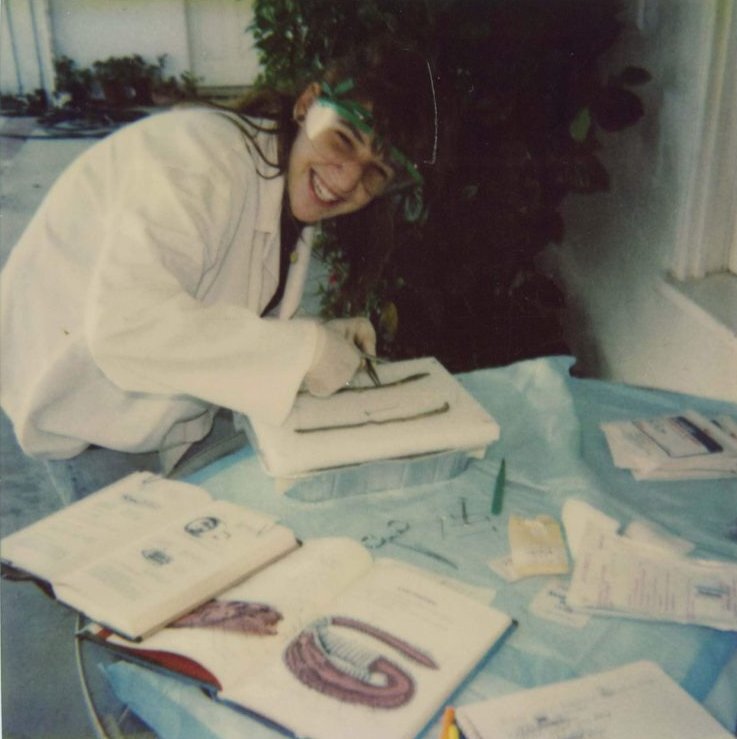
As a mom who is a scientist, people have often remarked that I explain things to my kids like…a scientist. And I guess it’s true. My ex’s uncle once overheard the answer I gave after my 4-year-old asked, “Where does the moon go at night, mama?” I explained a bit about how it doesn’t “go” anywhere but rather, we are rotating and turning round and round and we simply can’t see it in the day because it’s on the other side of our world.
He laughed and said his answer would have simply been, “It goes night-night.”
Being a scientist makes for a special kind of mom. My mother-in-law was that kind of mom, too, she says. She’s a microbiologist, so nothing was not explained in my ex’s household growing up. We kind of can’t help it, I guess.
My boys know about what rainbows really are. And they know about gravity for realz, yo. They also know about social injustice and the politics of the meat industry. So what do they know, you might be wondering, about the birds and the bees?
I know parents who walk around naked all the time to show it’s no big deal and it’s all social convention to make nakedness a “thing” …but that’s not me. I’m actually kind of a conservative person, and I believe in a certain amount of sacredness and modesty around the human body. I hope with all of my being that it doesn’t make my children think their bodies are bad or sinful, but rather that their bodies are special.
There is a story a parenting class teacher told me. A child asks, “Mama, where did I come from?” The mom starts sweating, but breaks into a whole speech about penises and vaginas and sperm and eggs and uteruses and everything. And the kid looks at her and says, “No, I mean where. New York? Los Angeles?” Right. Answer only what they are asking.
I had several years of answering only what they were asking. And then the day came when I had to answer what they were asking and they were asking literally about sex. Like, it was unmistakable that that is what the question was. It was from my older son, who was 8 at the time.
I’ve taught sex education and anatomy to high schoolers in a 10-student homeschool setting, but this was different. This was my kids. And they were not in high school.
I want to preserve my kids’ confidentiality and privacy, but here are the guidelines I used and will continue to use in these and other important talks.
- Never lie. Ever. You can say “I’m not sure how to answer that.” And you can tell part of the story without telling all of it. But never ever lie. As a general rule, with anyone about anything. That’s something that I have never regretted standing by.
- Preserve your privacy. It’s not the same as secrecy. If your child asks when you first could have made a baby by having sex and the answer is not something you want to share (yet), say so. It’s okay. If they ask when you last had sex, you can say, “That’s not something I want to share. It’s personal.” Let them know that certain topics don’t get shared with everyone, not because it’s wrong to talk about them, but because you get to choose what you talk about with whom.
- Use clinical terms. I like to use clinical terms since my sons had not heard any terms at all for any of this stuff and I can introduce whatever I want; I’m the mom, right? At first, I used “mommy cell” for egg and “daddy cell” for sperm. Then we moved on to egg (“Like a chicken egg? Eeeewwwww!”) and sperm. I never use diminutive terms for body parts. A penis is a penis. A vagina is a vagina. (Why the word for vagina has two “hard” consonants and sounds so..abrasive is really annoying, but I’m not ready to use the word “yoni” with them just yet.) Breasts are breasts.
- Gross them out. Don’t avoid subjects that might gross them out. My sons first learned about reproduction because I have a period every month and they see my “paraphernalia” sometimes. Because it’s not a secret. And it’s not bad. It’s just how it works. If an egg is fertilized, it grows a baby. If it’s not, it leaves your body with an entourage of uterine lining that basically looks like blood. That’s it. Period (hahahaha). When my boys have “eeewwwwed” about it, I remind them it’s because of this system that they even exist. That makes them pipe down.
- Variation. It’s up to each family how to handle birth control and topics like abortion, which, thankfully, I have not been asked about yet. But I assume it will come up at some point, and I will handle that accordingly. I know kids need to know about diseases and safe sex. I also know that the only way to know you will not get pregnant ever, ever, ever is to not make the “mommy cell” and “daddy cell” meet. Just sayin’.
- Laugh. It’s okay to laugh about these conversations. Not in a giggly, “I’m awkward because this is shameful” way, but in a “this is big stuff and it’s not stuff we have ever talked about and it’s big” kind of way.
- Communicate with your spouse or co-parent. It’s super important for parents to be on the same page about what they each talk to their kids about so they know the language they each use when talking to kids. (I found out when I was 35 that, until that point, my father assumed my mom had had “the talk” with me when I was younger since he had the talk with my brother and they had agreed to each talk to the same-sex child.) If, like me, you’re divorced and can’t roll over in bed and tell your spouse the amazing conversation about the birds and the bees you just had with your offspring, make sure to email said parent of your child or call them as soon as the kids are out of earshot. But be prepared for your ex to laugh hard and say, “Hmmm. They never bring that stuff up with me. They save all the good stuff for you!” Because sometimes, that happens.




 Read More From Mayim
Read More From Mayim
Grok Nation Comment Policy
We welcome thoughtful, grokky comments—keep your negativity and spam to yourself. Please read our Comment Policy before commenting.